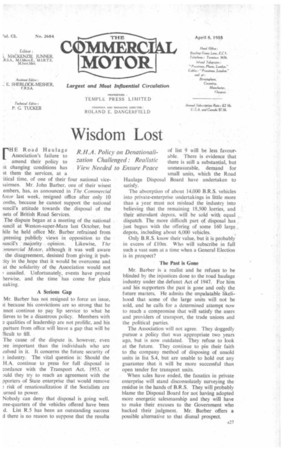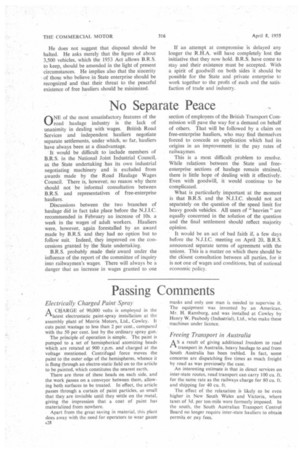Wisdom Lost
Page 29

Page 30

If you've noticed an error in this article please click here to report it so we can fix it.
rHE Road Haulage Association's failure to amend their policy to it changing conditions has St them the services, at a itical time, of one of their four national vice'airmen. Mr. John Barber, one of their wisest embers, has, as announced in The. Commercial rotor last week, resigned office after only 10 onths, because he cannot support the national iuncil's attitude towards the disposal of the sets of British Road Services.
The dispute began at a meeting of the national ouncil at Weston-super-Mare last October, but bile he held office Mr. Barber refrained from .pressing publicly views in opposition to the ,majority opinion. Likewise, The Rnmercial Motor, although it was well aware the disagreement, desisted from giving it pubity in the ,hope that it would be overcome and at the solidarity of the Association would not ; assailed. Unfortunately, events have proved herwise, and the time has come for plain caking.
A Serious Gap Mr. Barber has not resigned to force an issue, it because his convictions are so strong that he nnot continue to pay lip service to what he lieves to be a disastrous policy. Members with e qualities of leadership are not prolific, and his paiture from office will leave a gap that will be fficult to fill.
The cause of the dispute is, however, even Pre important , than the individuals who are volved in it. It concerns the future security of industry. The vital question is: Should the H.A. continue to press for full disposal in cordance with the Transport Act, 1953, or Duld they try to reach an agreement with the pporters of State enterprise that would remove risk .of renationalization if the Socialists are urned to power.
Nobody can deny that disposal is going well. Tee-quarters of the vehicles offered have been d. List R.5 has been an outstanding success d there is no reason to suppose that the results of list 9 will be less favourable. There is evidence that there is still a substantial, but unmeasurable, demand for small units, which the Road Haulage Disposal Board have undertaken to satisfy.
The absorption of about 14,000 B.R.S. vehicles into private-enterprise undertakings in little more than a year must not mislead the industry into believing that the remaining 18,500 lorries, and their attendant depots, will be sold with equal dispatch. The more difficult part of disposal has just begun with the offering of some 160 large depots, including about 6,000 vehicles.
Only B.R.S. know their value, but it is probably in excess of £10m. Who will subscribe in full such a vast sum at a time when a General Election is in prospect?
The Past is Gone Mr. Barber is a realist and he refuses to be blinded by the injustices done to the road haulage industry under the defunct Act of 1947. For him and his supporters the past is gone and only the future matters. He admits the unpalatable likelihood that some of the large units will not be sold, and he calls for a determined attempt now to reach a compromise that will satisfy the users and providers of transport, the trade unions and the political parties.
The Association will not agree. They doggedly pursue a policy that was appropriate two years ago, but is now outdated. They refuse to look at the future. They continue to pin their faith to the company method of disposing of unsold units in list 5.4, but are unable to hold out any guarantee that it will be more successful than open tender for transport units.
When sales have ended, the fanatics in private enterprise will stand disconsolately surveying the residue in the hands of B.R.S. They will probably blame the Disposal Board for not having adopted more energetic salesmanship and they will have to make their excuses to the Government who backed their judgment. Mr. Barber offers a possible alternative to that dismal prospect. He does not suggest that disposal should be halted. He asks merely that the figure of about 3,500 vehicles, which the 1953 Act allows B.R.S. to keep, should be amended in the light of present circumstances. He implies also that the sincerity of those who believe in State enterprise should be recognized and that their threat to the peaceful existence of free hauliers should be minimized. If an attempt at compromise is delayed any longer the R.H.A. will have completely lost the initiative that they now hold. B.R.S. have come to stay and their existence must be accepted. With a spirit of goodwill on both sides it should be possible for the State and private enterprise to work together to the profit of each and the satisfaction of trade and industry.




























































































